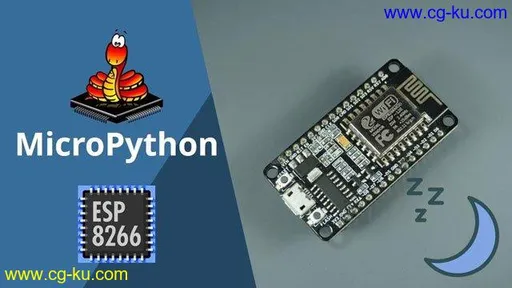MP4 | Video: h264, 1280x720 | Audio: AAC, 44.1 KHz, 2 Ch
Genre: eLearning | Language: English + .srt | Duration: 38 lectures (3 hours, 37 mins) | Size: 1.94 GB
The Fastest way to Prototype IOT Products/Applications Using NodeMCU(Powered by ESP8266) + MicroPython + PyCharm
What you'll learn
How to create smart IOT applications over NodeMCU hardware Using MircroPython ?
How to use Vibration / Temperature / Humidity Sensors ?
How to use Adafruit, Thingspeak, Google Voice, IFTTT apps to Analysis & Visualization of Sensor Data ?
Using PyCharm for Building IOT Apps
MPF Shell ?
HTTP Vs MQTT
Grabbing Sensor data and pushing over internet
Sensor Data Visualization through Thingspeak and Adafruit IO
Requirements
Little Knowledge on Basic Electronics
Windows10 Computer
A Bread Board with a bunch of jumper wires and supply MB102(Optional) (Costs 4$)
ESP8266 NodeMCU-V3 Board(Costs 3$, where as a PyBoard costs you 10 times)
RGB LED(Costs 0.5$)
Motion Sensor SW420 (Costs 0.75$)
Temperature and Humidity Sensor DHT11(Costs:1$)
PyCharm(Free)
Urge to Complete Course
[For New Lectures] 128 x 64 OLED Display - SSD1306 (Costs 1$)
[For New Lectures] uLiDAR Moule - VL6180x (Costs 3$)
[For New Lectures] Nokia 5110 Display (Costs 1.7$)
Description
Updates:
UPDATE 4 : Using Nokia5110 Display with NodeMCU, Parsing JSON Data with NodeMCU, Creating a Weather Station Dashboard using NodeMCU and Nokia 5110 Display
UPDATE 3: Using LiDAR for IOT Apps, A lecture on Gesture recognition using VL6180x is added to bonus lectures, vl6180x from STMicroElectronics is a popular sensor for mobile phones, which can also be used for IOT Apps, Have a look for new Ideas
UPDATE 2 : After Request from Students Asking about interfacing a display, we have uploaded few bonus lectures on working with SSD1306, a 128 x 64 OLED display, after taking these labs you will be able to draw objects, display your own images and run gif images over SSD1306
UPDATE 1 : After listening to candidates expressing their discomfort with instructor's accent ,Captions(CC) of all Lectures in the course are properly transcribed now and are not automatic(annoying)
Description :
This course gives a brief introduction to IOT and enables the students/enthusiasts to create very easy and useful applications through NodeMCU hardware and supporting sensors in a fastest way.
Regular courses which teach IOT through Raspberry pi may incur a cost of 30 - 50 $ including different sensors to complete the learning process, where as this course uses hardware like NodeMCU which is Open-source, Interactive, Low cost, Simple, Smart and WI-FI enabled hardware powered by ESP8266
Regular courses use C/ C++ language to code,Where as this course emphasizes more on the use of MicroPython which is a lean and efficient implementation of the Python 3 programming language that includes a small subset of the Python standard library and is optimised to run on microcontrollers and in constrained environments.
This Course uses popular PyCharm IDE from Jetbrains available free as community edition
Course is completely experimental / lab based and has no boring lectures
It shows how to interface and grab data from sensors like Vibration, Temperature, Humidity, Pressure
It teaches how to post / visualize the data grabbed from sensor on to internet, visualization brokers/interfaces like Thingspeak and Adafruit.IO are used
Apart from visualization the course also teaches how to control IOs/devices connected to NodeMCU hardware through internet from any place in the world using Google Voice Assistant and If This Then That (IFTTT) platforms
Our rationale to build/teach this course: We went through different courses on IOT and found that there is need for a course which can teach people about building IOT Apps under limited budget
Who this course is for:
Hobbyists, Electronics Beginner, Electronics Professionals


发布日期: 2020-02-17